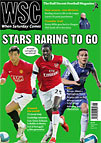 Vasco da Gama's new president had to overcome electoral fraud before tackling years of neglect. Robert Shaw reports
Vasco da Gama's new president had to overcome electoral fraud before tackling years of neglect. Robert Shaw reports
Like many Brazilian footballers, Carlos Roberto de Oliveira was always known by a nickname – in his case Dinamite. In a career spanning three decades he scored 470 goals for one of the big Rio clubs, Vasco da Gama, as well as having a brief spell at Barcelona. Now he has a new role, as a president of his former club, having defeated one of the most controversial figures in Brazilian football, Eurico Miranda, in an election at the end of June.
While he has been de-picted as a political novice alongside Miranda, the 54-year-old Dinamite had already been elected to the city and state assemblies of Rio de Janeiro on behalf of the centrist Partido do Movimento Democratico Brasileiro. Dinamite had lost two previous votes to Miranda, in 2003 and 2006, amid reports of intimidation. Both those votes took place at Vasco’s São Januario stadium, on a hillside hemmed in by favelas. The rerun elections for the club’s deliberative council and presidency in June were hosted in two more tranquil settings, at the old and new headquarters of Vasco’s rowing section, with observers from Brazil’s legal association OAB on hand to avoid further chicanery.
The repeat election at Vasco was deemed necessary because of irregularities that emerged during the November 2006 poll, including sundry phantom electors and one box stuffed solely with Miranda votes. The incumbent president, a lawyer by profession, had exploited various legal loopholes to delay a rerun until this summer.
The magnitude of Dinamite’s triumph was underlined at the formal confirmation of his election. Among the luminaries was Rio de Janeiro state governor Sergio Cabral, who described Dinamite as “the true face of Vasco”, together with former FIFA president João Havelange and former Brazil legend Junior, who are more closely associated with rival clubs Fluminense and Flamengo respectively.
A fortnight after Dinamite’s election win, Vasco’s new president sat beside his Flamengo counterpart Márcio Braga in the Maracanã for the big Rio derby. Miranda, by contrast, had always revelled in baiting Flamengo. But the for-mer president’s legacy remained evident, as Vasco’s mix of green recruits and veterans such as Edmundo were painfully outclassed by their opponents in a 3-1 defeat. Meanwhile fighting broke out in the Vasco section among fans aggrieved at the loss of the free tickets previously provided by Miranda.
The charge sheet against the former Vasco president is lengthy. There was his notorious intervention in the national championship final against São Caetano in December 2000, when he ordered injured spectators to be cleared from the pitch after fencing collapsed. Other items involve the disappearance of club funds, using the club as a springboard to Brazil’s national congress, the amassing of debts now estimated at around £70 million, the constant exodus of young talent and a star system centred unhealthily on Romário and Edmundo.
Under Miranda Vasco had won the Copa Libertadores in 1998, but their last successful season was nearly eight years ago, with the national championship and Copa Mercosur. Their only trophy since then was the Carioca (Rio state) title in 2003.
Last year Miranda invited ridicule by making Romário’s 1,000 career-goals target the club’s main priority. Vasco were knocked out of the Copa do Brasil in the second round by second-division opponents after spending 90 minutes trying to find the largely immobile Baixinho (Shorty) rather than win. Romário effectively paid to play as one of the club’s principal creditors and Edmundo’s return in 2008 after five years away only happened after he agreed to reschedule R$15m (£4.7m) of debts.
That the club’s most immediate problems are financial was highlighted by the recent sale of teenage prodigy Philippe Coutinho to Internazionale. While the new president has sought to allay fears about a drastic overhaul, there has been a purge of the football department with 15 employees being laid off. Coach Antonio Lopes, a noted Miranda ally, will survive only if he can bring about a rapid turnaround in the team’s fortunes.
Statues are often pulled down during revolutions, but the likeness of Romário that stands at the open end of São Januario in front of a chapel has been left intact for now. However, Dinamite has at least reinstated the team’s No 11 shirt, which had been retired by Miranda in homage. A gerontocracy has been overthrown, but Vasco’s new president still has a lot of work to do.
From WSC 259 September 2008